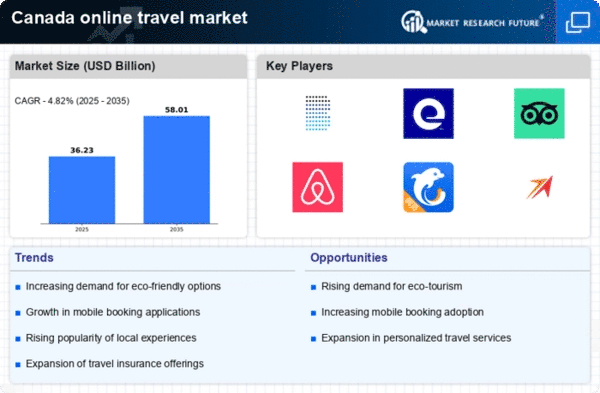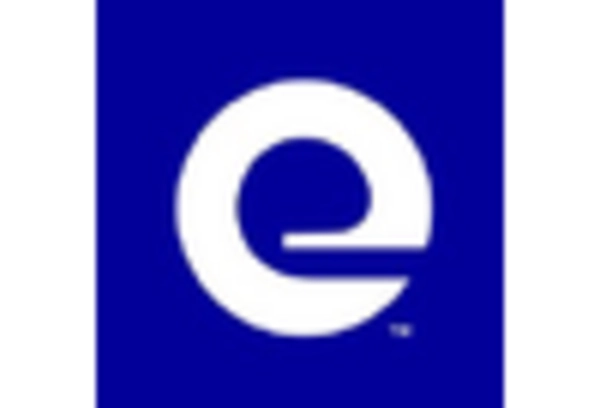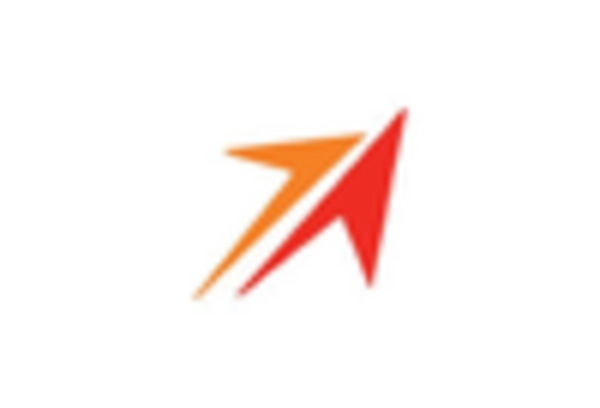Evolving Consumer Preferences
The online travel market in Canada is witnessing a shift in consumer preferences, particularly among younger generations who prioritize experiences over material possessions. This demographic is increasingly seeking unique travel experiences, such as adventure tourism and cultural immersion, which are often best accessed through online platforms. In 2025, it is projected that experiential travel will account for 60% of all travel bookings in Canada, indicating a significant transformation in consumer behavior. Additionally, the demand for flexible booking options and last-minute deals is on the rise, as travelers seek spontaneity in their travel plans. This evolution in preferences suggests that the online travel market must adapt to cater to these changing desires, potentially leading to innovative offerings and marketing strategies that resonate with modern travelers.
Increased Internet Penetration
The online travel market in Canada is significantly influenced by the increasing penetration of the internet across the country. As of 2025, approximately 95% of Canadians have access to high-speed internet, facilitating seamless online travel bookings. This widespread connectivity enables consumers to research, compare, and book travel options from the comfort of their homes. The rise in internet usage has also led to a growing trend of online reviews and social media influence, which play a crucial role in shaping consumer decisions. In fact, studies suggest that 80% of travelers consult online reviews before making travel arrangements. Consequently, the online travel market is poised for expansion as more Canadians embrace digital platforms for their travel needs, leading to a more competitive landscape among service providers.
Growth of Alternative Accommodation
The online travel market in Canada is increasingly characterized by the growth of alternative accommodation options, such as vacation rentals and home-sharing services. This trend is reshaping the landscape of travel accommodations, as consumers seek more personalized and cost-effective lodging solutions. In 2025, it is estimated that alternative accommodations will represent 30% of the total accommodation bookings in Canada, reflecting a shift away from traditional hotel stays. This growth is driven by the desire for unique experiences and the opportunity to connect with local cultures. As a result, the online travel market is adapting to include these options in their offerings, providing travelers with a wider array of choices that cater to diverse preferences and budgets. This diversification is likely to enhance competition and innovation within the market.
Focus on Health and Safety Standards
The online travel market in Canada is increasingly prioritizing health and safety standards as a key driver of consumer confidence. In 2025, travelers are more likely to choose services that demonstrate a commitment to cleanliness and safety protocols. This focus is particularly relevant in the context of heightened awareness surrounding health issues, leading to a demand for transparent communication regarding safety measures. Approximately 75% of Canadian travelers indicate that they consider health and safety information when making travel decisions. Consequently, the online travel market is responding by implementing and promoting enhanced safety protocols across various platforms. This emphasis on health and safety not only reassures consumers but also positions companies as responsible and trustworthy, potentially influencing their market share and customer loyalty.
Technological Advancements in Travel Booking
The online travel market in Canada is experiencing a surge in technological advancements that streamline the booking process. Innovations such as artificial intelligence and machine learning are enhancing user experiences by providing personalized recommendations and optimizing pricing strategies. In 2025, it is estimated that 70% of travelers in Canada will utilize mobile applications for booking, reflecting a shift towards convenience and efficiency. This trend indicates that the online travel market is adapting to consumer preferences, making it easier for users to compare prices and access real-time information. Furthermore, the integration of virtual reality in travel planning allows potential travelers to explore destinations before making decisions, thereby increasing engagement and satisfaction. As technology continues to evolve, the online travel market is likely to see further growth driven by these advancements.
















